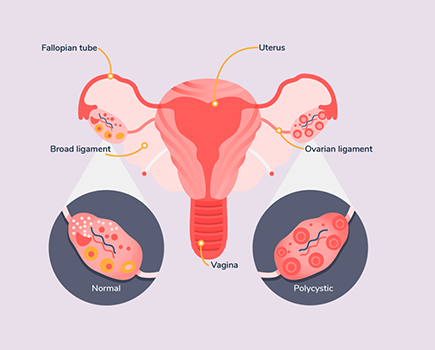
Polycystic Ovarian Syndrome (PCOS) is a hormonal imbalance that affects 6 to 12% of American women of childbearing age. This common disorder causes the ovaries to enlarge with numerous fluid-filled cysts (follicles) that do not regularly release with ovulation. Although not understood completely, scientists believe that PCOS causes are due to a combination of genetic and environmental factors.
In our previous blog, we got into the details of PCOS, the effects this condition has on your health, and how to diagnose PCOS. We also talked about some of the common symptoms, which as a recap, include:
- Irregular periods as a result of the lack of ovulation, which prevents the uterine lining from shedding every month.
- Excess hair growth in places where men usually have hair (face, back, chest, etc.)
- Hormonal acne, which is a result of excess androgen levels that cause oiler skin.
- Weight gain or a hard time losing weight.
- Hair loss that is similar to male-pattern baldness.
- Skin darkening that forms in body crease like those on the neck, groin, and under the breasts.

PCOS Treatment Options
The consequences of developing PCOS include infertility, obesity, and metabolic syndrome (diabetes, sleep apnea, high cholesterol). Even though there is no cure for PCOS, the management and treatment include weight loss, medications (birth control, metformin and Clomid), and ovarian surgery.
Before understanding the treatment options for polycystic ovarian syndrome, it is important to understand the relationship between PCOS and obesity. Physicians have studied PCOS for years, and it is still unclear whether being overweight causes PCOS or PCOS causes obesity. What is known is that women who are considered obese are at a higher risk of developing PCOS, and women with PCOS are at a higher risk of struggling with obesity.

We also know that women who have PCOS are insulin resistant—meaning the cells in your body do not respond well to the insulin produced, and what results is an excess of insulin released from the pancreas. This is one of the main reasons women who have PCOS struggle with their weight.
Therefore, it only makes sense that you can also tackle polycystic ovarian syndrome symptoms by managing your insulin levels by losing weight, exercising, and eating a healthy diet.
Weight Loss and PCOS
Weight loss is an important way to manage PCOS. It helps improve the symptoms by lowering blood sugars, decreasing insulin resistance (the way your body uses insulin), and help balance out your hormonal levels.
"Even a modest reduction in your weight — for example, losing 5 percent of your body weight — might improve your condition. Losing weight may also increase the effectiveness of medications your doctor recommends for PCOS, and can help with infertility." - Mayo Clinic
Weight Loss Surgery and PCOS
Bariatric surgery (weight loss surgery) is the most effective and durable tool for weight loss. Studies have shown improved fertility after bariatric surgery. The incidence of PCOS decreases from 45.6% to 6.8%, and infertility decreases from 18.2% to 4.3%.
Studies have also shown that women with a history of PCOS who underwent bariatric surgery and achieved successful weight loss had fewer pregnancy complications than women with PCOS who did not undergo bariatric surgery.
Studying the Impact of Bariatric Surgery on PCOS
Aside from achieving weight loss and insulin management through bariatric surgery, studies also found a statistically significant reduction in ovary size from 14 mL to 7.7 mL, and less women reported irregular menstrual periods.
Similarly, one of the causes of PCOS is believed to be high levels of androgens (aka testosterone and androstenedione) that regulate the development of male traits and result in hair growth, male-pattern baldness, acne and more.
Women who underwent bariatric surgery were found to have consistently lower levels of androgen, with an average of 32% decrease in total testosterone levels.
Bariatric surgery is, therefore, thought to be an excellent option for women who have polycystic ovarian syndrome. If you suffer from polycystic ovarian syndrome and obesity, consider weight loss surgery as a safe and effective way to treat PCOS and improve fertility.












